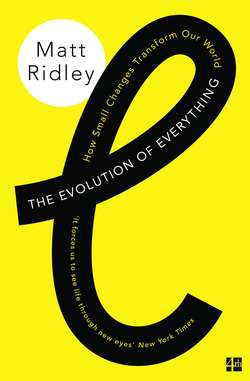Читать книгу The Evolution of Everything: How Small Changes Transform Our World - Matt Ridley, Matt Ridley - Страница 18
The evolution of law
ОглавлениеIt is an extraordinary fact, unremembered by most, that in the Anglosphere people live by laws that did not originate with governments at all. British and American law derives ultimately from the common law, which is a code of ethics that was written by nobody and everybody. That is to say, unlike the Ten Commandments or most statute law, the common law emerges and evolves through precedent and adversarial argument. It ‘evolves incrementally, rather than leaps convulsively or stagnates idly’, in the words of legal scholar Allan Hutchinson. It is ‘a perpetual work-in-progress – evanescent, dynamic, messy, productive, tantalizing, and bottom up’. The author Kevin Williamson reminds us to be astonished by this fact: ‘The most successful, most practical, most cherished legal system in the world did not have an author. Nobody planned it, no sublime legal genius thought it up. It emerged in an iterative, evolutionary manner much like a language emerges.’ Trying to replace the common law with a rationally designed law is, he jests, like trying to design a better rhinoceros in a laboratory.
Judges change the common law incrementally, adjusting legal doctrine case by case to fit the facts on the ground. When a new puzzle arises, different judges come to different conclusions about how to deal with it, and the result is a sort of genteel competition, as successive courts gradually choose which line they prefer. In this sense, the common law is built by natural selection.
Common law is a peculiarly English development, found mainly in countries that are former British colonies or have been influenced by the Anglo-Saxon tradition, such as Australia, India, Canada and the United States. It is a beautiful example of spontaneous order. Before the Norman Conquest, different rules and customs applied in different regions of England. But after 1066 judges created a common law by drawing on customs across the country, with an occasional nod towards the rulings of monarchs. Powerful Plantagenet kings such as Henry II set about standardising the laws to make them consistent across the country, and absorbed much of the common law into the royal courts. But they did not invent it. By contrast, European rulers drew on Roman law, and in particular a compilation of rules issued by the Emperor Justinian in the sixth century that was rediscovered in eleventh-century Italy. Civil law, as practised on the continent of Europe, is generally written by government.
In common law, the elements needed to prove the crime of murder, for instance, are contained in case law rather than defined by statute. To ensure consistency, courts abide by precedents set by higher courts examining the same issue. In civil-law systems, by contrast, codes and statutes are designed to cover all eventualities, and judges have a more limited role of applying the law to the case in hand. Past judgements are no more than loose guides. When it comes to court cases, judges in civil-law systems tend towards being investigators, while their peers in common-law systems act as arbiters between parties that present their arguments.
Which of these systems you prefer depends on your priorities. Jeremy Bentham argued that the common law lacked coherence and rationality, and was a repository of ‘dead men’s thoughts’. The libertarian economist Gordon Tullock, a founder of the public-choice school, argued that the common-law method of adjudication is inherently inferior because of its duplicative costs, inefficient means of ascertaining the facts, and scope for wealth-destroying judicial activism.
Others respond that the civil-law tradition, in its tolerance of arbitrary confiscation by the state and its tendency to mandate that which it does not outlaw, has proved less a friend of liberty than the common law. Friedrich Hayek advanced the view that the common law contributed to greater economic welfare because it was less interventionist, less under the tutelage of the state, and was better able to respond to change than civil legal systems; indeed, it was for him a legal system that led, like the market, to a spontaneous order.
A lot of Britain’s continuing discomfort with the European Union derives from the contrast between the British tradition of bottom–up law-making and the top–down Continental version. The European Parliament member Daniel Hannan frequently reminds his colleagues of the bias towards liberty of the common law: ‘This extraordinary, sublime idea that law does not emanate from the state but that rather there was a folk right of existing law that even the king and his ministers were subject to.’
The competition between these two traditions is healthy. But the point I wish to emphasise is that it is perfectly possible to have law that emerges, rather than is created. To most people that is a surprise. They vaguely assume in the backs of their minds that the law is always invented, rather than that it evolved. As the economist Don Boudreaux has argued, ‘Law’s expanse is so vast, its nuances so many and rich, and its edges so frequently changing that the popular myth that law is that set of rules designed and enforced by the state becomes increasingly absurd.’
It is not just the common law that evolves through replication, variation and selection. Even civil law, and constitutional interpretation, see gradual changes, some of which stick and some of which do not. The decisions as to which of these changes stick are not taken by omniscient judges, and nor are they random; they are chosen by the process of selection. As the legal scholar Oliver Goodenough argues, this places the evolutionary explanation at the heart of the system as opposed to appealing to an outside force. Both ‘God made it happen’ and ‘Stuff happens’ are external causes, whereas evolution is a ‘rule-based cause internal to time and space as we experience them’.
